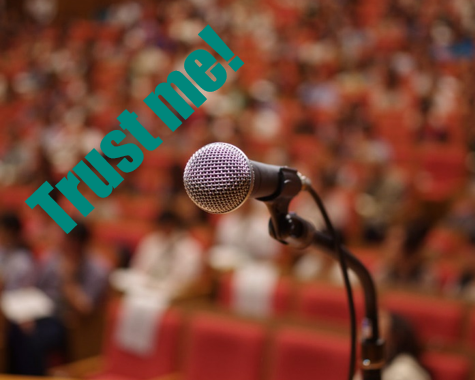Coronavirus lessons for public speakers
Covid 19 is driving all of us to online meetings, seminars, conferences and many other opportunities to keep in touch with our friends, family and colleagues. However, I’ve been struck by the coronavirus lessons for public speakers based on some of the things going on in public life and slogans adopted to communicate with us and keep us all safe during these challenging times.
1. Confusing messages have no impact
Sounds obvious, doesn’t it? But over the past few weeks, the UK has received unclear, indecisive messages about what to do in the face of the coronavirus crisis. Language such as ‘should’, ‘could’, ‘might’ is indefinite and confusing. If we want people to respond to our calls to action, we need to be precise and unambiguous.
To find your clear message, start at the end. What do you want your audience to think, feel or do after they’ve heard what you have to say? If you are clear about the answer, you will be able to articulate it in about 10 words. If you can’t, you need to strip back and reduce your ideas to their very essence. In the words of Albert Einstein:
“If you can’t explain it simply, you don’t understand it well enough.”
If you can then convert your message into an anchor phrase or ‘soundbite’ that encapsulates the content of your speech and is short, rhythmic and rhymes, then you have a memorable takeaway that will make your words live on long after you have finished speaking. For example, ‘failing to prepare is preparing to fail’, ‘women’s rights are human rights’, ‘I have a dream…’
2. Expertise brings credibility
We are repeatedly being told that decisions about coronavirus are being led by science and the expertise of scientists. We are persuaded by their expertise. Aristotle told us that there are three elements to delivering a persuasive message – Ethos (our credibility as speakers), Logos (evidence, facts and figures that need to be explored), and Pathos (emotional engagement with your audience). The combination of these three is key. Consider how, for instance, the ‘facts’ of science are being infused with more emotional messages about the need for us to be responsible to save lives.
As speakers, we need to establish our credibility. This doesn’t mean that only people who have been doing it for years or are famous are eligible to speak. Indeed, time alone is often a poor reason to speak, especially if the message doesn’t evolve and reflect current challenges. Speaking is an opportunity and your expertise, experience or involvement in a project are your authority, your credibility. Make sure you or your meeting host establish your credibility from the outset and don’t forget to dress accordingly to reinforce that position.
3. Get personal and active
If you want people to pay attention to, and act on, what you’re saying, you need to make it personal. ‘You’ is the magic word. ‘You’ is inherently inclusive and individual at the same time. Its use instantly includes everyone in the audience and speaks to each person as an individual, so that they feel as if you are speaking directly to them.
Dial up the number of times you use the word. Barak Obama had this down to a fine art when it came to connecting with his listeners. In his 2012 presidential election victory speech, Obama used the personal pronoun ‘I’ 36 times. In stark contrast, he used ‘you/you’re/your’ 55 times and ‘we/us/our’ 97 times.
The official line has been passive and slow to get to the point. Phrases like “You should work from home” and “social distancing” are vague and flat. If we want people to do something, we need to give people a reason, make it personal so that they can see the benefit and speak in the more immediate and present style of the active voice. Fortunately, the world of hashtags is more dynamic, active and to the point #WFH #WorkFromHome #StayHome #StaySafeSaveLives #KeepYourDistance.
4. We will get through this!
There’s a conviction being conveyed that, together, we will overcome coronavirus. This belief is helpful when it comes to managing our nerves and building our confidence as speakers. Being nervous is completely normal and you are not alone. As Mark Twain observes:
“There are two types of speakers. Those who get nervous and those who are liars.”
Not only are nerves part of being human, speaking is a learnable skill and we can learn to channel our nerves into the energy we need to speak in front of an audience. To help us do this, I have developed the PRO apPROach to befriending our nerves:
- Bring a sense of PROportion to our speaking, taking our foot off the panic pedal and working through what it is that frightens us; how we can prevent these fears becoming a reality and any damage limitation if they do; the costs of not speaking for our personal profile, careers, businesses, etc and the significant benefits of having a go.
- PROgram your brain away from the adrenaline-rushing, survival, primordial response to the idea of public speaking so that you can learn to recognise it as something ’we will get through’ and, over time, enjoy. Move the spotlight onto your audience and think of yourself as giving them something of value. Try to talk about things that matter to you and your audience so that your enthusiasm shines through and celebrate your success every time you give a speech or presentation. It’s a big deal. You can think about improvements later. PROgram a ‘pat on the back’ and reduce the survival response.
- Embrace a PROcess of incremental improvements. Start with small audiences. Practise at every opportunity. Now is a great time with all these online meetings and gatherings. Identify specific skills you want to work on and invite feedback so that the process is always one of ongoing learning and growth.
5. ‘Don’t touch your face!’ and other non-verbal signals
This is a great tip from a body language perspective. When we touch our faces as speakers, we make our audience wonder what we have to hide. Any trust we have built up will be undermined. Keep your hands away from your face and use them with purpose to reinforce your words.
Essentials of body language online include a heartfelt smile and steady eye contact. But don’t forget to maintain a good posture. It’ll make you feel more confident and send that to your audience. Similarly, if you are sitting, use an office-type chair and adopt an upright position. I see a number of people sitting forward in a chair and then they begin to sway to and fro. This makes them look nervous and is highly distracting. Similarly, if you’re standing, plant yourself firmly, soften your knees and lean slightly into the balls of your feet for additional energy. Dial down movement, when you’re online, you’re effectively on the ‘small screen’ and large gestures can overwhelm or distract.
6. In this together
Speaking at its most impactful is an outcome of co-creation between speaker and audience. It’s not about a speaker talking AT their audience, but rather having a conversation WITH them. Conversation is a two-way, negotiated experience.
At the moment, we’re seeing a lot more kindness and humanity, so now is a great time to have a go. Interact with your audience – ask them questions, mirror their body language, tap into their reactions. Invite their input on the spot and see where it takes you.
7. And a final thought… how do you stand out online when everyone has moved there?
It was already difficult to stand out in the world of social media, where so many people are creating and sharing content. Now, more than ever, you need to find ways to attract attention. Consider, for instance:
- How you can bring a fresh twist to your content. You might adopt a different perspective or discipline. If, for instance, you’re a neuroscientist, what can a musician bring to your message (eg David Eagleman and Anthony Brandt)?
- Explore your ideas through play and see how your message or theory evolves.
- Tell a relevant personal story or share your personal vision.
And, of course, bring interesting vocal stylings to your delivery in terms of variety of pace, pitch, volume, pausing. If you’re in any doubt about you vocal skills, try reading a story to a child, they’ll soon let you know if you’re not up to scratch!
Now you’re talking in the time of coronavirus! I’d love to hear about the coronavirus lessons for public speakers you are reminded of at this time.






